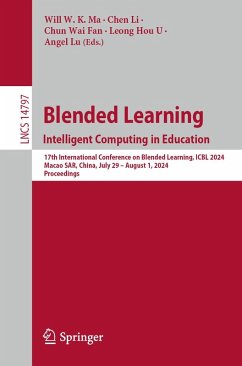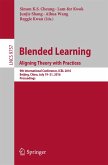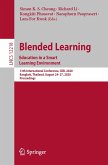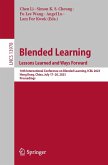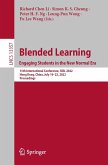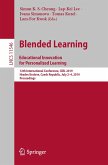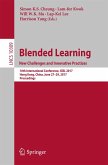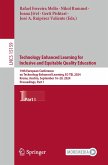Blended Learning. Intelligent Computing in Education (eBook, PDF)
17th International Conference on Blended Learning, ICBL 2024, Macao SAR, China, July 29 - August 1, 2024, Proceedings
Redaktion: Ma, Will W. K.; Lu, Angel; U, Leong Hou; Fan, Chun Wai; Li, Chen
53,95 €
53,95 €
inkl. MwSt.
Sofort per Download lieferbar

27 °P sammeln
53,95 €
Als Download kaufen

53,95 €
inkl. MwSt.
Sofort per Download lieferbar

27 °P sammeln
Jetzt verschenken
Alle Infos zum eBook verschenken
53,95 €
inkl. MwSt.
Sofort per Download lieferbar
Alle Infos zum eBook verschenken

27 °P sammeln
Blended Learning. Intelligent Computing in Education (eBook, PDF)
17th International Conference on Blended Learning, ICBL 2024, Macao SAR, China, July 29 - August 1, 2024, Proceedings
Redaktion: Ma, Will W. K.; Lu, Angel; U, Leong Hou; Fan, Chun Wai; Li, Chen
- Format: PDF
- Merkliste
- Auf die Merkliste
- Bewerten Bewerten
- Teilen
- Produkt teilen
- Produkterinnerung
- Produkterinnerung

Bitte loggen Sie sich zunächst in Ihr Kundenkonto ein oder registrieren Sie sich bei
bücher.de, um das eBook-Abo tolino select nutzen zu können.
Hier können Sie sich einloggen
Hier können Sie sich einloggen
Sie sind bereits eingeloggt. Klicken Sie auf 2. tolino select Abo, um fortzufahren.

Bitte loggen Sie sich zunächst in Ihr Kundenkonto ein oder registrieren Sie sich bei bücher.de, um das eBook-Abo tolino select nutzen zu können.
This book constitutes the refereed proceedings of the 17th International Conference on Blended Learning. Intelligent Computing in Education, ICBL 2024, held in Macao, China, during July 29 - August 1, 2024.
The 26 papers presented in this volume were carefully reviewed and selected from 71 submissions.
The selected papers are classified into four primary themes: revolutionizing education with AI; blended learning and technological innovations; advancements in learning analytics; and innovative approaches in educational research.
- Geräte: PC
- ohne Kopierschutz
- eBook Hilfe
- Größe: 20.36MB
Andere Kunden interessierten sich auch für
![Blended Learning: Aligning Theory with Practices (eBook, PDF) Blended Learning: Aligning Theory with Practices (eBook, PDF)]() Blended Learning: Aligning Theory with Practices (eBook, PDF)40,95 €
Blended Learning: Aligning Theory with Practices (eBook, PDF)40,95 €![Blended Learning. Education in a Smart Learning Environment (eBook, PDF) Blended Learning. Education in a Smart Learning Environment (eBook, PDF)]() Blended Learning. Education in a Smart Learning Environment (eBook, PDF)65,95 €
Blended Learning. Education in a Smart Learning Environment (eBook, PDF)65,95 €![Blended Learning : Lessons Learned and Ways Forward (eBook, PDF) Blended Learning : Lessons Learned and Ways Forward (eBook, PDF)]() Blended Learning : Lessons Learned and Ways Forward (eBook, PDF)53,95 €
Blended Learning : Lessons Learned and Ways Forward (eBook, PDF)53,95 €- -23%11
![Blended Learning: Engaging Students in the New Normal Era (eBook, PDF) Blended Learning: Engaging Students in the New Normal Era (eBook, PDF)]() Blended Learning: Engaging Students in the New Normal Era (eBook, PDF)61,95 €
Blended Learning: Engaging Students in the New Normal Era (eBook, PDF)61,95 € ![Blended Learning: Educational Innovation for Personalized Learning (eBook, PDF) Blended Learning: Educational Innovation for Personalized Learning (eBook, PDF)]() Blended Learning: Educational Innovation for Personalized Learning (eBook, PDF)53,95 €
Blended Learning: Educational Innovation for Personalized Learning (eBook, PDF)53,95 €![Blended Learning. New Challenges and Innovative Practices (eBook, PDF) Blended Learning. New Challenges and Innovative Practices (eBook, PDF)]() Blended Learning. New Challenges and Innovative Practices (eBook, PDF)40,95 €
Blended Learning. New Challenges and Innovative Practices (eBook, PDF)40,95 €![Technology Enhanced Learning for Inclusive and Equitable Quality Education (eBook, PDF) Technology Enhanced Learning for Inclusive and Equitable Quality Education (eBook, PDF)]() Technology Enhanced Learning for Inclusive and Equitable Quality Education (eBook, PDF)65,95 €
Technology Enhanced Learning for Inclusive and Equitable Quality Education (eBook, PDF)65,95 €-
-
-
This book constitutes the refereed proceedings of the 17th International Conference on Blended Learning. Intelligent Computing in Education, ICBL 2024, held in Macao, China, during July 29 - August 1, 2024.
The 26 papers presented in this volume were carefully reviewed and selected from 71 submissions.
The selected papers are classified into four primary themes: revolutionizing education with AI; blended learning and technological innovations; advancements in learning analytics; and innovative approaches in educational research.
The 26 papers presented in this volume were carefully reviewed and selected from 71 submissions.
The selected papers are classified into four primary themes: revolutionizing education with AI; blended learning and technological innovations; advancements in learning analytics; and innovative approaches in educational research.
Dieser Download kann aus rechtlichen Gründen nur mit Rechnungsadresse in A, B, BG, CY, CZ, D, DK, EW, E, FIN, F, GR, HR, H, IRL, I, LT, L, LR, M, NL, PL, P, R, S, SLO, SK ausgeliefert werden.
Produktdetails
- Produktdetails
- Verlag: Springer Nature Singapore
- Seitenzahl: 346
- Erscheinungstermin: 28. Juni 2024
- Englisch
- ISBN-13: 9789819744428
- Artikelnr.: 72243420
- Verlag: Springer Nature Singapore
- Seitenzahl: 346
- Erscheinungstermin: 28. Juni 2024
- Englisch
- ISBN-13: 9789819744428
- Artikelnr.: 72243420
- Herstellerkennzeichnung Die Herstellerinformationen sind derzeit nicht verfügbar.
.- Keynotes:.
.- Building a Learner-Centric Citywide Digital Literacy Ecosystem: Train-the-Trainer, Community-Based Learning, and Gifted Education.
.- Educational Technology trends in the AI era.
.- How to design scientific, happy and effective educational games: Research on educational game design from the perspective of learning sciences.
.- Blended Learning and AI: Enhancing Teaching and Learning in Higher Education.
.- Digital Literacy: Evolution, Evaluation and Enhancement.
.- Revolutionizing Education with AI:.
.- Complexities of Using Large Language Model Generative AI in Health Education and Robots (ID20).
.- New Dimensions: The Impact of the Metaverse and AI Avatars on Social Science Education (ID27).
.- Construction and Implementation of Generative AI-based Human-Machine Collaborative Classroom Teaching Model in Universities (ID46).
.- DMP_AI: An AI-Aided K-12 System for Teaching and Learning in Diverse Schools (ID64.
.- A Case Study Examines How a New Content Integration Impacts Learning Outcomes with AI Experience Inputs (ID68).
.- Blended Learning and Technological Innovations:
.- Understanding characteristics of teacher-student dialogue in urban-rural blended synchronous classroom: A learning analytics perspective (ID7).
.- Integrating a digital math vector game into a blended classroom: technological and instructional design principles (ID19).
.- K12 Blended Learning in China of "Education+" era: from the perspective of ecology (ID31).
.- AIGC empowered blended learning in university course design and implementation: A case study (ID43).
.- Exploring preschool teachers' perceived challenges in using ICT in Hong Kong after the pandemic (ID63).
.- Investigating Relationships Among Institutional Support, Perceived Technology Usefulness, Attitude Toward Using Technology and Teacher Professional Development Motivation: A Moderated Mediation Model (ID22).
.- Advancements in Learning Analytics:.
.- An Analysis of Learning Analytics Approaches for Course Evaluation (ID25).
.- Uncovering Students' Processing Tactics towards ChatGPT's Feedback in EFL Education Using Learning Analytics (ID38).
.- Enhancing EFL Learners' Knowledge of L2 Requests during Mobile-mediated Text-based and Audio-based Dynamic Assessment (ID44).
.- Investigating Learning Behaviors and Intervention Effectiveness of Students with Special Educational Needs (ID62).
.- Study on the Influencing Factors of Middle School Students' Deep Learning Competencies in the Smart Classroom Environment (ID36).
.- Innovative Approaches in Educational Research:.
.- A Study on the Design and Implementation of the Smart Site Safety System from the Stakeholders' Perspectives (ID51).
.- Enhancing Youth Creativity through Computer-Supported Collaborative Learning: A Preliminary Investigation in Rural Chinese Elementary School (ID69).
.- Leveraging deep learning for classifying learner-generated course evaluation texts (ID26).
.- Analysis of Cyber Range Scenario Design--A Case Study (ID54).
.- Capturing Teachers' Collaborative Talk Patterns in an Interdisciplinary Lesson Study: A Social Epistemic Network Signature Approach (ID39).
.- Building a Learner-Centric Citywide Digital Literacy Ecosystem: Train-the-Trainer, Community-Based Learning, and Gifted Education.
.- Educational Technology trends in the AI era.
.- How to design scientific, happy and effective educational games: Research on educational game design from the perspective of learning sciences.
.- Blended Learning and AI: Enhancing Teaching and Learning in Higher Education.
.- Digital Literacy: Evolution, Evaluation and Enhancement.
.- Revolutionizing Education with AI:.
.- Complexities of Using Large Language Model Generative AI in Health Education and Robots (ID20).
.- New Dimensions: The Impact of the Metaverse and AI Avatars on Social Science Education (ID27).
.- Construction and Implementation of Generative AI-based Human-Machine Collaborative Classroom Teaching Model in Universities (ID46).
.- DMP_AI: An AI-Aided K-12 System for Teaching and Learning in Diverse Schools (ID64.
.- A Case Study Examines How a New Content Integration Impacts Learning Outcomes with AI Experience Inputs (ID68).
.- Blended Learning and Technological Innovations:
.- Understanding characteristics of teacher-student dialogue in urban-rural blended synchronous classroom: A learning analytics perspective (ID7).
.- Integrating a digital math vector game into a blended classroom: technological and instructional design principles (ID19).
.- K12 Blended Learning in China of "Education+" era: from the perspective of ecology (ID31).
.- AIGC empowered blended learning in university course design and implementation: A case study (ID43).
.- Exploring preschool teachers' perceived challenges in using ICT in Hong Kong after the pandemic (ID63).
.- Investigating Relationships Among Institutional Support, Perceived Technology Usefulness, Attitude Toward Using Technology and Teacher Professional Development Motivation: A Moderated Mediation Model (ID22).
.- Advancements in Learning Analytics:.
.- An Analysis of Learning Analytics Approaches for Course Evaluation (ID25).
.- Uncovering Students' Processing Tactics towards ChatGPT's Feedback in EFL Education Using Learning Analytics (ID38).
.- Enhancing EFL Learners' Knowledge of L2 Requests during Mobile-mediated Text-based and Audio-based Dynamic Assessment (ID44).
.- Investigating Learning Behaviors and Intervention Effectiveness of Students with Special Educational Needs (ID62).
.- Study on the Influencing Factors of Middle School Students' Deep Learning Competencies in the Smart Classroom Environment (ID36).
.- Innovative Approaches in Educational Research:.
.- A Study on the Design and Implementation of the Smart Site Safety System from the Stakeholders' Perspectives (ID51).
.- Enhancing Youth Creativity through Computer-Supported Collaborative Learning: A Preliminary Investigation in Rural Chinese Elementary School (ID69).
.- Leveraging deep learning for classifying learner-generated course evaluation texts (ID26).
.- Analysis of Cyber Range Scenario Design--A Case Study (ID54).
.- Capturing Teachers' Collaborative Talk Patterns in an Interdisciplinary Lesson Study: A Social Epistemic Network Signature Approach (ID39).
.- Keynotes:.
.- Building a Learner-Centric Citywide Digital Literacy Ecosystem: Train-the-Trainer, Community-Based Learning, and Gifted Education.
.- Educational Technology trends in the AI era.
.- How to design scientific, happy and effective educational games: Research on educational game design from the perspective of learning sciences.
.- Blended Learning and AI: Enhancing Teaching and Learning in Higher Education.
.- Digital Literacy: Evolution, Evaluation and Enhancement.
.- Revolutionizing Education with AI:.
.- Complexities of Using Large Language Model Generative AI in Health Education and Robots (ID20).
.- New Dimensions: The Impact of the Metaverse and AI Avatars on Social Science Education (ID27).
.- Construction and Implementation of Generative AI-based Human-Machine Collaborative Classroom Teaching Model in Universities (ID46).
.- DMP_AI: An AI-Aided K-12 System for Teaching and Learning in Diverse Schools (ID64.
.- A Case Study Examines How a New Content Integration Impacts Learning Outcomes with AI Experience Inputs (ID68).
.- Blended Learning and Technological Innovations:
.- Understanding characteristics of teacher-student dialogue in urban-rural blended synchronous classroom: A learning analytics perspective (ID7).
.- Integrating a digital math vector game into a blended classroom: technological and instructional design principles (ID19).
.- K12 Blended Learning in China of "Education+" era: from the perspective of ecology (ID31).
.- AIGC empowered blended learning in university course design and implementation: A case study (ID43).
.- Exploring preschool teachers' perceived challenges in using ICT in Hong Kong after the pandemic (ID63).
.- Investigating Relationships Among Institutional Support, Perceived Technology Usefulness, Attitude Toward Using Technology and Teacher Professional Development Motivation: A Moderated Mediation Model (ID22).
.- Advancements in Learning Analytics:.
.- An Analysis of Learning Analytics Approaches for Course Evaluation (ID25).
.- Uncovering Students' Processing Tactics towards ChatGPT's Feedback in EFL Education Using Learning Analytics (ID38).
.- Enhancing EFL Learners' Knowledge of L2 Requests during Mobile-mediated Text-based and Audio-based Dynamic Assessment (ID44).
.- Investigating Learning Behaviors and Intervention Effectiveness of Students with Special Educational Needs (ID62).
.- Study on the Influencing Factors of Middle School Students' Deep Learning Competencies in the Smart Classroom Environment (ID36).
.- Innovative Approaches in Educational Research:.
.- A Study on the Design and Implementation of the Smart Site Safety System from the Stakeholders' Perspectives (ID51).
.- Enhancing Youth Creativity through Computer-Supported Collaborative Learning: A Preliminary Investigation in Rural Chinese Elementary School (ID69).
.- Leveraging deep learning for classifying learner-generated course evaluation texts (ID26).
.- Analysis of Cyber Range Scenario Design--A Case Study (ID54).
.- Capturing Teachers' Collaborative Talk Patterns in an Interdisciplinary Lesson Study: A Social Epistemic Network Signature Approach (ID39).
.- Building a Learner-Centric Citywide Digital Literacy Ecosystem: Train-the-Trainer, Community-Based Learning, and Gifted Education.
.- Educational Technology trends in the AI era.
.- How to design scientific, happy and effective educational games: Research on educational game design from the perspective of learning sciences.
.- Blended Learning and AI: Enhancing Teaching and Learning in Higher Education.
.- Digital Literacy: Evolution, Evaluation and Enhancement.
.- Revolutionizing Education with AI:.
.- Complexities of Using Large Language Model Generative AI in Health Education and Robots (ID20).
.- New Dimensions: The Impact of the Metaverse and AI Avatars on Social Science Education (ID27).
.- Construction and Implementation of Generative AI-based Human-Machine Collaborative Classroom Teaching Model in Universities (ID46).
.- DMP_AI: An AI-Aided K-12 System for Teaching and Learning in Diverse Schools (ID64.
.- A Case Study Examines How a New Content Integration Impacts Learning Outcomes with AI Experience Inputs (ID68).
.- Blended Learning and Technological Innovations:
.- Understanding characteristics of teacher-student dialogue in urban-rural blended synchronous classroom: A learning analytics perspective (ID7).
.- Integrating a digital math vector game into a blended classroom: technological and instructional design principles (ID19).
.- K12 Blended Learning in China of "Education+" era: from the perspective of ecology (ID31).
.- AIGC empowered blended learning in university course design and implementation: A case study (ID43).
.- Exploring preschool teachers' perceived challenges in using ICT in Hong Kong after the pandemic (ID63).
.- Investigating Relationships Among Institutional Support, Perceived Technology Usefulness, Attitude Toward Using Technology and Teacher Professional Development Motivation: A Moderated Mediation Model (ID22).
.- Advancements in Learning Analytics:.
.- An Analysis of Learning Analytics Approaches for Course Evaluation (ID25).
.- Uncovering Students' Processing Tactics towards ChatGPT's Feedback in EFL Education Using Learning Analytics (ID38).
.- Enhancing EFL Learners' Knowledge of L2 Requests during Mobile-mediated Text-based and Audio-based Dynamic Assessment (ID44).
.- Investigating Learning Behaviors and Intervention Effectiveness of Students with Special Educational Needs (ID62).
.- Study on the Influencing Factors of Middle School Students' Deep Learning Competencies in the Smart Classroom Environment (ID36).
.- Innovative Approaches in Educational Research:.
.- A Study on the Design and Implementation of the Smart Site Safety System from the Stakeholders' Perspectives (ID51).
.- Enhancing Youth Creativity through Computer-Supported Collaborative Learning: A Preliminary Investigation in Rural Chinese Elementary School (ID69).
.- Leveraging deep learning for classifying learner-generated course evaluation texts (ID26).
.- Analysis of Cyber Range Scenario Design--A Case Study (ID54).
.- Capturing Teachers' Collaborative Talk Patterns in an Interdisciplinary Lesson Study: A Social Epistemic Network Signature Approach (ID39).
